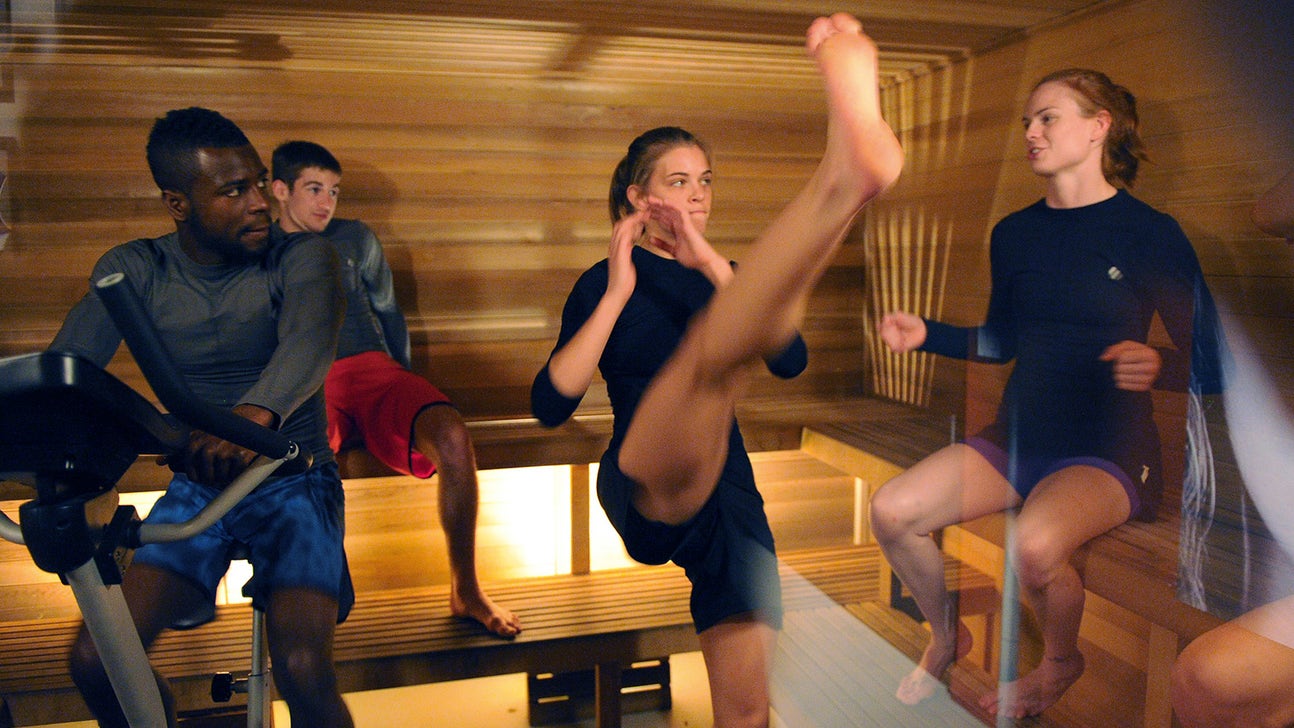
The dangerous culture of weight cutting on 'The Ultimate Fighter'

The list of athletes that have come to the UFC via The Ultimate Fighter over the last 18 seasons number in the hundreds, but there are also a lonely list of names that were cut from the show without ever being eliminated via the competition.
Some left the show voluntarily because they missed their girlfriend, others were booted after bad behavior, but up until this latest season, Gabe Ruediger, Kenny Stevens and Jason Guida stood together for a particularly notorious distinction.
All three fighters missed weight prior to competition - none more memorable than Gabe 'Put Me Back In' Ruediger as part of The Ultimate Fighter season five when he was literally asking his coach BJ Penn and teammates to drag him back into the sauna to help him shed the last few pounds he needed to cut. In the end, Ruediger didn't make weight and he was released from the show.
Any fighter that's ever had to cut weight will say that it can be one of the most miserable experiences to go through just 24 hours away from competition, but for those athletes that appear on The Ultimate Fighter, many times they are asked to make weight at least two or three times over a six week period.
In many past seasons of the series, fighters would enter The Ultimate Fighter house competing at a weight class higher than their normal division just to prevent the situation where they would be forced to cut 15 or 20 pounds, multiple times over a six-week period. Kenny Florian famously fought at 185 pounds during season one of the reality show, and by the time his career was over he had cut as low as featherweight to fight in the UFC.
During the latest edition of The Ultimate Fighter, two different competitors - Cody Bollinger and Anthony Gutierrez - joined the list for not making weight during the competition. Both received a very harsh speech from UFC president Dana White for committing the transgression of taking a spot on the show and leaving simply because they could not cut the weight.
The scenarios that unfolded this season, however, bring up two possible issues that the series may be facing in the coming years. First off, is it fair to ask any fighter to cut weight multiple times over a six week period and two, are the right fighters being cast on the show for the correct weight classes?
Cody Bollinger was one of the unfortunate souls who found out what it's like to land on White's bad side when he failed to make the 135-pound weight limit for his bout against Anthony Gutierrez in the quarterfinal round. He was immediately cut from the cast, and after it was over Bollinger admitted that the weight-cutting debacle was all his fault, but he also revealed that prior to The Ultimate Fighter he had never even competed at bantamweight before.
"The blame's on me. It was my fault, there's no excuse for that. I've done it without coaches before. It's your job as a fighter and I know how to do it. I did it wrong, my body wouldn't cooperate that day. I couldn't sweat. It was my fault and I accepted that," Bollinger told FOX Sports.
"I knew going into the show that it would be a really tough weight cut. I've never fought at 35's before. The last time I even competed at 35 was in wrestling when I was in eighth grade. I'm usually a 45'er but we made a lot of adjustments to make sure I could make weight to get in the house and I did. It was the toughest weight cut that I've ever had, but I made it. I just didn't learn how to go through that on a regular basis."

Sam Alvey competed on TUF as a welterweight when he's normally a light heavyweight.
Season 16 cast member Sam Alvey had a similar story when he competed on the show as a welterweight coached by Shane Carwin and Roy Nelson. For a big part of his career, Alvey was a light heavyweight before eventually shedding quite a bit of weight to move down to 185 pounds.
Miraculously, Alvey's appearance on The Ultimate Fighter came at 170 pounds and he admits it was one of the most grueling experiences of his life. The opportunity to fight in the UFC comes with a price, however, and Alvey was willing to sacrifice his body to get there.
"Most of my career I've been at 205 and then I made the cut to 185 and that was a pretty big cut. Then 29 days before the show aired I got asked to be on the show so I cut 40 pounds in that 29 days," Alvey said.
While Alvey made the cut for the show with a stunning knockout in the elimination round, when it came time for him to make the welterweight limit a second time, his body just shut down. Alvey eventually made the weight, but his performance the next day could only be described as lifeless and lackluster.
"I was so drained after the cut and I just never regained," Alvey said. "I mean in the fight I threw three punches, I had two takedowns or what could have been takedowns had I used it. It just wasn't my day."
During the first season where The Ultimate Fighter opened up to featherweights and bantamweights, Akira Corassani saw this as his golden chance to get into the UFC by way of the popular reality show. Fighting at 145 pounds was an easy choice for Corassani, but once he got on the show he figured out just how tough dropping that much weight could be when doing it two or three times.
Looking back now, Corassani believes that his time on the show actually put so much punishment on his body that it opened him up to a litany of injuries he suffered after it was over. He ended up taking two months off earlier this year just to get his body back to full health before booking his next fight at this weekend's Ultimate Fighter finale card in Las Vegas.
"During those six weeks I was picked late to fight, so I fought two fights in one week and I was heavy in the house. I'm a little on the heavier side so in total I cut like 65 pounds in six weeks, up and down. I had three hard weight cuts and my body was hurting," Corassani told FOX Sports.
Ultimate Fighter 18 finalist Chris Holdsworth won't make any excuses for his former housemates Bollinger and Guteirrez, who both failed to make weight this season. Still, as a massive bantamweight competing at 135 pounds where he was forced to shed the weight on three different occasions, Holdsworth sympathizes with what they went through.
"It's definitely not an easy task to keep your weight that low," Holdsworth said. "I'm a pretty big 135'er myself, but I think that MMA has a lot to do with discipline, sacrifice and making the right choices. I'm pretty disciplined and I make a lot of sacrifices and I know what needs to be done to get my weight down and keep it down."

Mike Dolce's dieting expertise helped Johny Hendricks easily make 170lbs at UFC 167.
The UFC does provide medical personnel and during this season of the show and several times in the past as well, coaches have brought in personal nutritionists to help their fighters make weight. Still, it doesn't necessarily curb the danger of the human body cutting that many pounds several times in less than two months.
The foremost expert on this entire subject may be nutritionist Mike Dolce, who not only has worked with a laundry list of top fighters while seeing them through the rigors of weight cutting, but he was also a part of The Ultimate Fighter season seven as a competitor. Dolce, who fought most of his career as a welterweight, took the chance to fight on the show as a middleweight because he knew the weight cut wouldn't be as brutal on his body.
Seeing the misery that both Bollinger and Gutierrez went through this season while dropping upwards of 20 pounds doesn't sit well with Dolce. He believes if a fighter is going to cut weight three or four times over a six week period, they shouldn't be dropping more than a few pounds each time - not the massive cuts that have been witnessed lately.
"On my season it was 185 pounds and most of the guys on my season dropped a weight class. I'm a welterweight, I was a welterweight before that. Gerald Harris had his successes at welterweight, Amir Sadollah who actually won the show dropped down to welterweight so it's very typical. In the TUF format the unwritten rule is that you're fighting a weight class up because you have to make multiple weight cuts," Dolce explained when speaking to FOX Sports. "If (the show) is one weight class, the winner could fight five times in six weeks - that's five weigh-ins! So you can't make your true weight class."
Dolce points to one of his prize clients as an example for how weight cutting should be handled on The Ultimate Fighter.
Top UFC welterweight contender Johny Hendricks has been competing at 170 pounds since he started fighting, but according to Dolce the idea of him suffering through three or four weight cuts over a six week period isn't just ludicrous - it's dangerous.
"Johny Hendricks could never do that. He walks around over 200 pounds, healthy. So if he were to do the Ultimate Fighter he would be 185 possibly even 205 depending, while his true competition weight is 170," Dolce explained.
"It's not recommended. I don't recommend it; I think it's terrible. It's unhealthy, that's why you want to compete at a weight class up. So now you're competing at close to your natural body weight. You don't eat breakfast that day, you squeeze out a few pounds of water and you're on weight. You can do that multiple times."
Dolce says the current trend of competitors trying out for the show or being selected when it's clear that a foreboding weight cut lies ahead needs to change. There's no denying that The Ultimate Fighter is potentially the opportunity of a lifetime, but is it worth giving up your life to get there?
"Guys want that opportunity and I get that," Dolce said. "They think well let me roll the dice and make it, but once they do that their reputation is on the line and their health is on the line. That's the most important part."
As seasons roll forward, casting directors along with the UFC brass may be forced to make some tough choices when selecting cast members to avoid situations like what arose this season. Fighters could have to show proof that they have fought at a certain weight class before being chosen, or experts like Dolce could be brought in to measure body weight and other factors prior to someone being selected.
Either way, the culture of weight cutting is a subject that will continue to be explored and possibly exploited no matter what adjustments are made, but The Ultimate Fighter seems like the perfect place for changes to start taking place.

